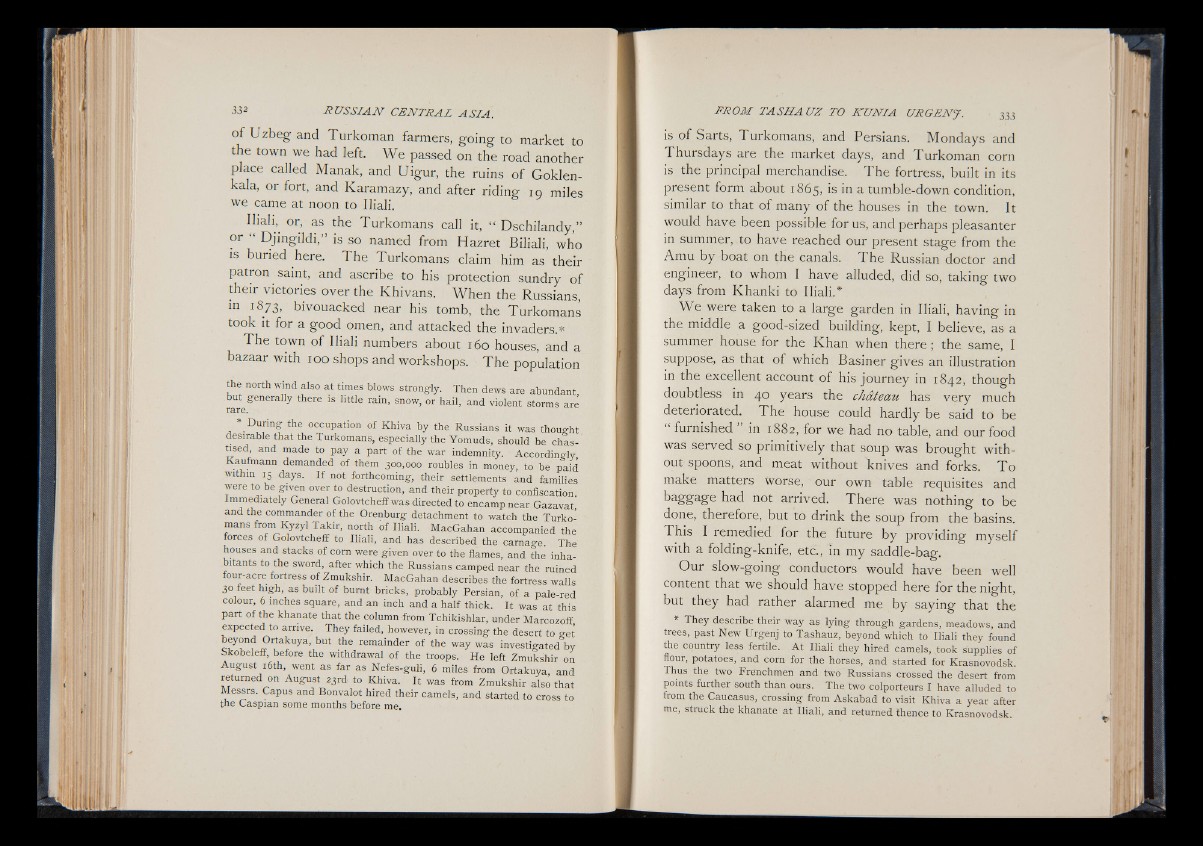
of Uzbeg and Turkoman farmers, going to market to
the town we had left. We passed on the road another
place called Manak, and Uigur, the ruins o f Goklen-
kala, or fort, and Karamazy, and after riding 19 miles
we came at noon to Iliali.
IhaU or, as the Turkomans call it, “ Dschilandy,”
or “ Djingildi,” is so named from Hazret Biliali, who
is buried here. The Turkomans claim him as their
patron saint, and ascribe to his protection sundry of
their victories over the Khivans. When the Russians,
in 18731 bivouacked near his tomb, the Turkomans
took it for a good omen, and attacked the invaders.*
The town of Iliali numbers about 160 houses, and a
bazaar with 100 shops and workshops. The population
the north wind also at times blows strongly. Then dews are abundant,
but generally there is little rain, snow, or hail, and violent storms are
rare.
* During the occupation of Khiva by the Russians it was thought
desirable that the Turkomans, especially the Yomuds, should be chastised,
and made to pay a part of the war indemnity. Accordingly
Kaufmann demanded of them 300,000 roubles in money, to be paid
within 15 days. If not forthcoming, their settlements and families
were to be given over to destruction, and their property to confiscation.
Immediately General Golovtcheff was directed to encamp near Gazavat
and the commander of the Orenburg detachment to watch the Turkomans
from Kyzyl Takir, north of Iliali. MacGahan accompanied the
forces of Golovtcheff to Iliali, and has described the carnage. The'
houses and stacks of corn were given over to the flames, and the inhabitants
to the sword, after which the Russians camped near the ruined
four-acre fortress of Zmukshir. MacGahan describes the fortress walls
30 feet high, as built of burnt bricks, probably Persian, of a pale-red
colour, 6 inches square, and an inch and a half thick. It was at this
part of the khanate that the column from Tchikishlar, under Marcozoff
expected to arrive. They failed, however, in crossing the desert to get
beyond Ortakuya, but the remainder of the way was investigated by
Skobeleff, before the withdrawal of the troops. He left Zmukshir on
August 16th, went as far as Nefes-guli, 6 miles from Ortakuya and
returned on August 23rd- to Khiva. It was from Zmukshir also that
Messrs. Capus and Bonvalot hired their camels, and started to cross to
the Caspian some months before me.
is of Sarts, Turkomans, and Persians. Mondays and
Thursdays are the market days, and Turkoman corn
is the principal merchandise. The fortress, built in its
present form about 1865, is in a tumble-down condition,
similar to that of many of the houses in the town. It
would have been possible for us, and perhaps pleasanter
in summer, to have reached our present stage from the
Amu by boat on the canals. The Russian doctor and
engineer, to whom I have alluded, did so, taking two
days from Khanki to Iliali.*
We were taken to a large garden in Iliali, having in
the middle a good-sized building, kept, I believe, as a
summer house for the Khan when there ; the same, I
suppose, as that of which Basiner gives an illustration
in the excellent account of his journey in 1842, though
doubtless in 40 years the château has very much
deteriorated. The house could hardly be said to be
“ furnished ” in 1882, for we had no table, and our food
was served so primitively that soup was brought without
spoons, and meat without knives and forks. T o
make matters Worse, our own table requisites and
baggage had not arrived. There was nothing to be
done, therefore, but to drink the soup from the basins.
This I remedied for the future by providing myself
with a folding-knife, etc., in my saddle-bag.
Our slow-going conductors would have been well
content that we should have stopped here for the night,
but they had rather alarmed me by saying that the
They describe their way as lying through gardens, meadows, and
trees, past New Urgenj to Tashauz, beyond which to Iliali they found
the country less fertile. At Iliali they hired camels, .took supplies of
flour, potatoes, and corn for the horses, and started for Krasnovodsk.
Thus the two Frenchmen and two Russians crossed the desert from
points further south than ours. The two colporteurs I have alluded to
from the Caucasus, crossing from Askabad to visit Khiva a year after
me, struck the khanate at Iliali, and returned thence to Krasnovodsk.